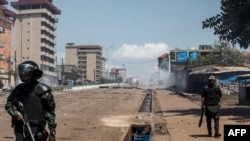A Guinean public prosecutor on Monday ordered a list of all police officers present when a young man was killed during demonstrations last week, in a significant shift from past practice.
Conakry's public prosecutor, Alphonse Charles Wright, also told police to hand over records of operational orders after an autopsy found that 19-year-old Thierno Mamadou Diallo was killed by a bullet during the June 1 protest.
Relatives say Diallo was not involved in the demonstration against rising fuel prices, where clashes broke out between security forces and demonstrators.
"The Public Prosecutor's Office ... warns against any political exploitation of the judicial investigation and reiterates that it will initiate legal proceedings in accordance with the law," Wright said.
He said judicial authorities would take control of the crime scene.
The move represents a marked change from the recent past.
Under the regime of President Alpha Conde, who was overthrown in September 2021, human rights groups regularly criticized security forces for using excessive force with impunity.
Dozens of Guineans were killed between 2019 and 2021 during demonstrations against Conde's plans for a third term.
Almost no police or gendarmes have been held to account, human rights activists say.
The ruling junta has promised to break with past practices. Diallo's death — one of the first civilians to die during a protest since the coup — puts that commitment to the test.
His funeral was due to take place in the suburbs of the capital Conakry on Monday but his family told AFP it had been postponed.
In an announcement on Sunday, Wright cautioned people against exploiting the funeral to demonstrate, warning that authorities would crack down "in case of problems" during the march.
The National Front for the Defense of the Constitution (FNDC), a political coalition, had called for a march to coincide with the funeral but later called it off.
In a statement, the FNDC called on the public to maintain pressure on the authorities "so that no citizen will ever again be killed with impunity."
The junta's decisions to investigate and arrest prominent Guineans and ban protests until an election in three years' time have sparked growing discontent against perceived authoritarianism.





